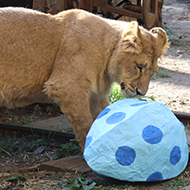
Lions, meerkats and lemurs tuck into their favourite snacks.
With the Easter holidays in full swing, keepers at ZSL London Zoo are treating their residents to “an assortment of seasonal surprises”, including an enormous papier-mâché egg for the young lions to investigate and enjoy.
While chocolate is not on the menu, the animals are enjoying a feast of some of their favourite snacks, specially prepared for the occasion. The Zoo’s endangered ring-tailed lemurs have been enjoying sweet potato cubes, hidden in a carefully handcrafted nest, woven from dried grapevines, twine and rope.
Elsewhere, the zoo’s meerkats, Frank, Penelope and Dracula, put their exploratory skills to the test by foraging inside another papier-mâché egg filled with mealworms. Lion cubs Mali, Syanii and Shanti, who turned one last month, have also been delighting visitors with their playful antics — pouncing and rolling around on a giant Easter egg, scented with perfumes and spices.
Zoological operations manager, Dan Simmonds, said: “Easter is often a time for treats, and while there were no chocolate eggs in sight for the animals, our meerkats and ring-tailed lemurs enjoyed some of their favourites — mealworms and sweet potato.
“Our Asiatic lion cubs, who have just turned one, are at a crucial stage in their development, honing their natural exploratory and hunting instincts. Enrichment — like the enormous, scented Easter egg — plays an important role in this, helping to diversify their habitat and encouraging them to fully engage their strength and remarkably keen sense of smell.”
Image (C) ZSL London Zoo.



 The Federation of Independent Veterinary Practices (FIVP) has announced a third season of its podcast, Practice Matters.
The Federation of Independent Veterinary Practices (FIVP) has announced a third season of its podcast, Practice Matters.